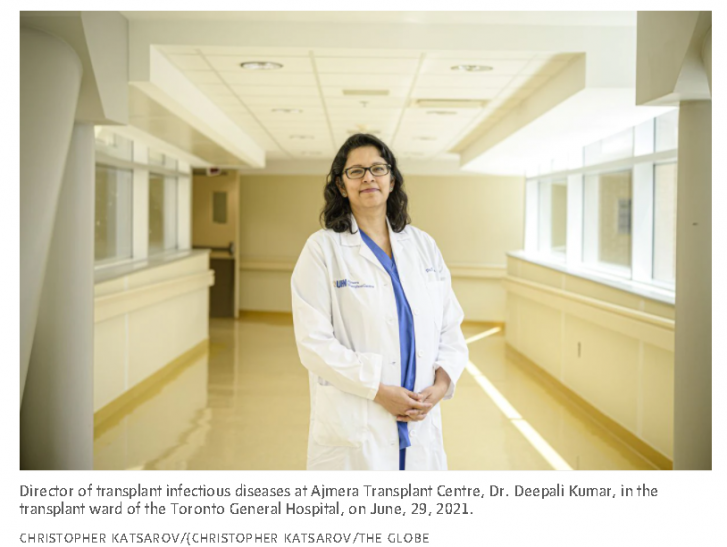Heart transplant recipient Donna Speed hoped that getting vaccinated against the coronavirus would be a ticket back to normal life.
Throughout the pandemic, the 66-year-old resident of Flamborough, Ont., had to be acutely aware of infection risk because the anti-rejection medications she takes suppress her immune system in a way that makes her especially vulnerable to COVID-19.
That’s why Ms. Speed was so discouraged to discover through her participation in a research study that getting jabbed did not spur her immune cells to produce any detectable antibodies.

“It was kind of scary to think, ‘I’m right back at square one again,’” she said.
Ms. Speed is one of tens of thousands of Canadian transplant recipients who are waiting to see if more can be done to protect them from COVID-19 – including offering them a third shot, as France is already doing. The elderly and people with HIV, certain cancers and autoimmune disorders could be in line for a third shot, too, if research shows that extra doses prod weaker immune systems into action.
Although small studies from the U.S. and France hint at some benefit, the scientific jury is still out on whether a third shot makes a significant difference for transplant recipients on anti-rejection drugs – the group that appears least likely to derive protection from COVID-19 vaccines.
Researchers at Toronto’s University Health Network (UHN) are hoping to provide some clarity with what is believed to be the world’s first randomized controlled trial offering third doses to transplant recipients. The study has enrolled 120 patients, half of whom received a third shot of Moderna’s mRNA vaccine two months after their second dose, and half of whom received a placebo in place of their third jab.
Ms. Speed is one of the participants. She is also one of approximately 28,000 Canadians living with an organ transplant, according to the Canadian Institute for Health Information (that tally excludes Quebec).
Study leader Deepali Kumar, the director of transplant infectious diseases at UHN’s Ajmera Transplant Centre, is expecting the results of the post-third dose antibody tests in a few weeks.
Dr. Kumar already knows that her study participants didn’t mount much of a response to their initial COVID-19 inoculations: Five per cent produced detectable antibodies after a first dose and 34.5 per cent did so after a second, she said.
One challenge for researchers such as Dr. Kumar is that it’s not clear how high antibody levels need to be to keep the coronavirus at bay. Other facets of the immune system, including T cells, play a role as well, but they are trickier to measure.
“The issue with all these studies is that we don’t really have a protective range defined,” Dr. Kumar said. “So we’re always saying ‘positive for antibodies,’ but the antibody levels that we’re seeing in transplant recipients are at least 100-fold lower than in the general population. So it doesn’t mean that if you’re positive, you’re actually protected.”
Still, there is reason to believe third shots could help.
A French study of 101 transplant recipients, published as a letter in the New England Journal of Medicine last week, found a third dose of the Pfizer-BioNTech vaccine “significantly improved the immunogenicity of the vaccine, with no cases of COVID-19 reported in any of the patients.”
A Johns Hopkins University study of 30 transplant recipients who hunted down third doses on their own found that a quarter of 24 patients who were negative for antibodies before a third dose had high-positive levels afterward. Six patients who had detectable but low antibody levels after two doses had high levels after a third shot.
But 16 remained negative for antibodies, even after a third dose.
“The message from our study was at least a hopeful message in that there were people who did not have an optimal immune response to two doses who actually did improve their antibody response dramatically to a third dose,” said Dorry Segev, a transplant surgeon and researcher at Johns Hopkins University School of Medicine, who was one of the authors of the study.
Preliminary research suggests that other immunocompromised populations respond better than transplant recipients to COVID-19 vaccines, though not necessarily as well as healthy adults. In most cases, the problem is the vaccines struggling to overcome the power of immune-suppressing treatments, not the underlying illness itself.
One exception appears to be B-cell chronic lymphocytic leukemia. Vaccinated patients with that type of blood cancer failed to produce detectable antibodies in three-quarters of cases, according to a small study from the University of Pittsburgh School of Medicine. Most were not undergoing treatment at the time.
For now, Canada’s National Advisory Committee on Immunization (NACI) is waiting for more evidence before it considers recommending third doses for any immunocompromised populations, said Mark Johnson, a spokesman for the Public Health Agency of Canada.
NACI is a group of independent experts that advises the public health agency.
“While increased levels of antibodies following a third dose may be encouraging, there is currently no confirmed immunological correlate of protection against COVID-19 disease or SARS-CoV-2 infection. As such, the change in antibody levels in relation to protection against COVID-19 disease is still unclear,” Mr. Johnson said in a statement.
Article From: GlobeandMail
Author: HEALTH REPORTER

